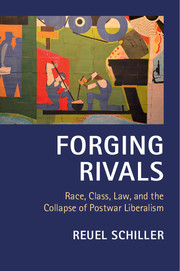Book contents
- Frontmatter
- Dedication
- Epigraph
- Contents
- Acknowledgments
- Introduction: Legal History and the Death of Postwar Liberalism
- 1 Forging Postwar Liberalism
- 2 Ed Rainbow's Problem
- 3 The Phony Commission
- 4 A Tale of Two Propositions
- 5 1966: A Terrible Year for George Johns
- 6 “The Day of the Minstrel Show Is Over”
- 7 Forging Rivals, Shattering Liberalism
- List of Abbreviations for Archival Sources
- Notes
- Index
3 - The Phony Commission
Published online by Cambridge University Press: 05 April 2015
- Frontmatter
- Dedication
- Epigraph
- Contents
- Acknowledgments
- Introduction: Legal History and the Death of Postwar Liberalism
- 1 Forging Postwar Liberalism
- 2 Ed Rainbow's Problem
- 3 The Phony Commission
- 4 A Tale of Two Propositions
- 5 1966: A Terrible Year for George Johns
- 6 “The Day of the Minstrel Show Is Over”
- 7 Forging Rivals, Shattering Liberalism
- List of Abbreviations for Archival Sources
- Notes
- Index
Summary
Staring out the window of his office at 500 Golden Gate Avenue in the fall of 1960, John Riordan could see the top of City Hall's enormous, gilt dome, two blocks away. The packing crates in his office, however, nearly blocked the view. As the third and final executive secretary of the San Francisco Commission on Equal Employment Opportunity (CEEO), Riordan's job was to close up shop. The Commission, which had been in existence for a little more than three years, was about to cease operations. Its primary job had been to adjudicate claims of employment discrimination that occurred within the city. With the passage of a statewide fair employment practices (FEP) law the previous year, there was now no reason for the Commission to exist. Indeed, Riordon's two predecessors as executive secretary, Ed Howden and John Delury, were already in Sacramento, working for the new state Fair Employment Practices Commission.
Riordan, on the other hand, was trying to dispose of the last of the CEEO's backlog of cases. Like his predecessors, his goal was to resolve these cases informally – to mediate the dispute and settle it to the satisfaction of both parties. Not a single one of the eighty complaints that the Commission had received over the previous three years had required the public, formal adjudication that the city ordinance establishing the CEEO created. Yet one last case, Pacific Motor Trucking, was dragging on and on. Before he left for Sacramento, Delury had worked out a settlement. While the employer would not admit that it had discriminated (employers rarely did), it agreed to hire the employee who had alleged the discrimination. It even agreed to give him seniority to reflect the fact that, but for his race, it would have hired him several months earlier. But just a couple of days after Riordan started work, the settlement fell apart. The company's attorney claimed he couldn't reinstate the worker because the union that represented Pacific Motor Trucking's workers objected.
- Type
- Chapter
- Information
- Forging RivalsRace, Class, Law, and the Collapse of Postwar Liberalism, pp. 81 - 119Publisher: Cambridge University PressPrint publication year: 2015

